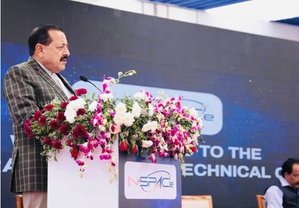India aims 5-fold increase in global space economy share: Union Minister
New Delhi, March 5: After Prime Minister Narendra Modi took the decision to “unlock” the space sector from the “veil of secrecy”, the country is now targeting a five-fold increase in its share of the global space economy, Union Minister of State (Independent Charge) for Science and Technology, Jitendra Singh, said on Tuesday.
After launching the Technical Centre of the Indian National Space Promotion and Authorisation Centre (IN-SPACe) in Ahmedabad, the minister said that the role of the private sector in advancing India’s space technology and exploration efforts is undeniable.
“PM Modi has broken taboos of the past by opening the space sector to public-private-participation,” said the minister.
“India’s space economy today stands at a modest $8 billion, but our own projection is that by 2040, it will multiply manifold. According to some international observers, for example the recent ADL (Arthur D Little) Report mentions that we could have the potential of $100 billion by 2040,” he added.
Even though talent was never lacking in the country, the missing link of enabling milieu was created under the leadership of PM Modi.
“With the opening up of the space sector, the common man has been able to witness the launch of mega space events like Chandrayaan-3 or Aditya,” the minister further said.
“Four-five years ago, the country barely had startups in the space sector. Today, we have nearly 200 private space startups after opening up of the sector while the earlier ones have even turned entrepreneurs. There has been an investment of over Rs 1,000 crore by private space startups in the current financial year from April to December 2023,” the minister informed.
This is the best time for innovators, R&D and startups in the space sector.
“If you see the space budget alone, there is a 142 per cent increase in the last nine years,” the minister said.
Out of the 424 foreign satellites launched by ISRO since the 1990s, more than 90 per cent or 389 were launched in the last nine years. The government has announced the Indian Space Policy 2023, which enables end-to-end participation of non-governmental entities (NGEs) in all domains of space activities.



